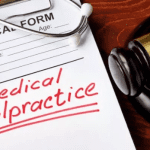Experiencing a personal injury can have far-reaching consequences that extend beyond physical pain and medical bills. The emotional and psychological impact of such incidents can be significant, often affecting an individual’s overall well-being. In times of distress, seeking legal help from a New Jersey injury lawyer becomes essential to address the financial aspects of the injury. However, it is equally important to recognize the influence of personal injury on psychological well-being and explore the assistance and therapeutic approaches available for recovery.
Personal injuries can result from various incidents such as car accidents, workplace mishaps, or medical malpractice. The aftermath of such events often leaves individuals traumatized, anxious, and struggling with a range of negative emotions. This emotional burden can lead to the development of conditions such as post-traumatic stress disorder (PTSD), depression, anxiety disorders, or even exacerbate pre-existing mental health issues.
When faced with the challenges of dealing with both physical and emotional injuries, it is crucial to seek professional help. Personal injury lawyers can offer guidance and support in navigating the legal aspects of personal injury claims. These attorneys specialize in advocating for the rights of the injured, ensuring fair compensation for medical expenses, lost wages, and other damages. By alleviating the financial burden, they provide individuals with the necessary resources to focus on their recovery and psychological well-being.
However, legal assistance alone may not be sufficient to address the psychological impact of personal injury. Therapeutic approaches play a vital role in helping individuals heal from the emotional wounds caused by such traumatic experiences. Seeking counseling or therapy can provide a safe and supportive environment to express feelings, process trauma, and develop coping mechanisms.
One of the therapeutic approaches commonly used in cases of personal injury is cognitive-behavioral therapy (CBT). CBT focuses on identifying and challenging negative thoughts and behaviors, helping individuals reframe their perceptions of the injury and its consequences. By learning new ways to cope with distressing emotions and develop resilience, individuals can regain a sense of control over their lives and improve their psychological well-being.
Another effective therapeutic approach is eye movement desensitization and reprocessing (EMDR). EMDR is particularly beneficial for individuals struggling with post-traumatic stress disorder (PTSD) resulting from personal injuries. By integrating eye movements or other forms of bilateral stimulation, this therapy helps reprocess traumatic memories and reduces the distress associated with them. EMDR empowers individuals to let go of the emotional weight tied to their injury and move forward with their lives.
In addition to professional therapy, support groups can also play a crucial role in the recovery process. Connecting with others who have experienced similar injuries provides a sense of validation and understanding. Sharing stories, strategies, and experiences can foster a supportive community that encourages individuals to heal, both mentally and emotionally.
It is important to remember that the influence of personal injury on psychological well-being is unique to each individual. The path to recovery may differ, and a personalized approach is often necessary. While seeking legal assistance from a New Jersey injury attorney is crucial, integrating therapeutic approaches tailored to an individual’s needs can significantly enhance their overall well-being.
If You’ve Been Injured, Consult with a New Jersey Injury Attorney Today
In conclusion, personal injuries can have a profound impact on an individual’s psychological well-being. Seeking legal help from a New Jersey injury lawer is crucial for addressing the financial aspects of the injury. However, it is equally important to recognize the importance of therapeutic approaches in healing emotional wounds. Cognitive-behavioral therapy (CBT), eye movement desensitization and reprocessing (EMDR), and support groups can provide valuable assistance in navigating the emotional aftermath of personal injuries. By acknowledging the influence of personal injury on psychological well-being and accessing the necessary support, individuals can embark on a journey of recovery, resilience, and restoration.






